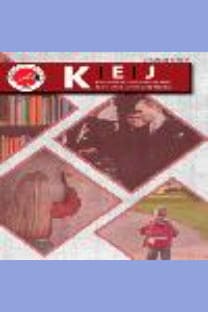ÜSTÜN YETENEKLİ BİR ÇOCUĞUN EBEVEYNİ OLMAK1
Yaşıtlarından öğrenme hızı, derinliği ve ilgi alanlarının genişliği anlamında farklı ve “üstün yetenekli” olduğunu öğrendiği bir çocuğa sahip olmak her aile için korkutucu olabilir. Anne-babanın, üstün yetenekli çocuğun kabiliyetlerini ulaşabileceği en üst noktaya çıkarmak ve bunu sürekli kılmak konusunda özellikle ilk yaşlarında oldukça büyük bir sorumluluğu vardır. Ebeveynler, üstün yetenekli çocuklarının yetenek, ilgi ve kapasitelerini ulaşabileceği en üst noktaya ulaştırmak gibi büyük bir sorumluluğu ancak onları çok iyi anlayarak, gözlemleyerek ve olumlu bir şekilde yönlendirerek geçekleştirebilirler. Bu çalışmada üstün yetenekli çocuğa sahip anne-babalara yol gösterecek yaratıcı yaklaşımlar geliştirebilmeleri için dikkat edilmesi gereken bazı hususlara yer verilecektir.
Anahtar Kelimeler:
erken çocukluk, üstün yetenekli çocuklar, aile
BEING THE PARENT OF A GIFTED CHILD
Having a child who is different from his/her peers regarding speed and depth of learning and scope of fields of interest and is found to be “gifted” may be scary for all families. Parents have a high responsibility to increase the skills of gifted children to the highest attainable point and sustain that level, particularly in the early ages of the child’s life. Parents can realize the high responsibility of increasing the skills, interests and capacities of gifted children to the highest level only through understanding them well, observing them and directing them positively. This study elaborates on some issues that need to be taken into consideration by parents that have a gifted child to develop guiding creative approaches.
Keywords:
early childhood, gifted children, family,
___
- 1. Alisinanoğlu F., Özbey, S. ve Kahveci, G., Okul Öncesinde Fen Eğitimi., Ankara, Nobel Yayıncılık, 2007.
- 2. Carter, T. M., The play problems of gifted children, School and Society, 86,224-225, 1958.
- 3. Costa, A.L., Developing your child’s habits of success in school, life and work. Habits of Mind.(s:8-13). Virginia: Association for Supervision and Curriculum Development Alexandria, 2000.
- 4. Çağdaş A.ve Seçer, Z.Ş., Anne-Baba Eğitimi, 2.Baskı, Ankara, Kök Yayıncılık, 2006.
- 5. Çağlar, D. (2004b). “Üstün Zekalı Çocukların Eğitimi ve Öğretimi” Seçilmiş Makaleler Kitabı I. Türkiye Üstün Yetenekli Çocuklar Kongresi İstanbul, Çocuk Vakfı Yayınları
- 6. Dağlıoğlu H.E. ve Çakır F. “Erken Çocukluk Döneminde Düşünme Becerilerinden Planlama ve Derin Düşünmenin Geliştirilmesi.” Eğitim ve Bilim Dergisi c:33, sayı:144, s:28- 35. Nisan 2007
- 7. Dağlıoğlu H.E., “Üstün Yetenekli Çocukların Aileleri” Hacettepe Üniversitesi Çocuk Gelişimi ve Eğitimi Dergisi, Haziran-Aralık 2005.
- 8. Davis G.A. ve Rimm S.B., Education of The Gifted and Talented, 5th Ed, America, Pearson Education Inc, 2004.
- 9. Feldman, D. H., with Goldsmith, L, Nature’s gambit: Child prodigies and the development of human potential, New York, Basic Boks, 1986.
- 10. Framer D., Some Ideas on Parenting Gifted Preschoolers, 1996. www.giftedpreschoolers.org
- 11. Gönen M. ve ark., Çocuklar için Yaratıcı Etkinlikler, İstanbul, Epsilon Yayıncılık, 2006.
- 12. Hanson, I. A., Comparision between parent identification of young bright children and subsequent testing, Rooper Review, 7, 44-45, 1984.
- 13. Ho, W-C., Yani: The brush of innocence, New York, Hudson Hills Pres, 1988.
- 14. Jackson, N. E., & Butterfield, E. C., A conception of giftedness designed to promote research, In R. J. Sternberg & J. E. Davidson (Eds.), Conceptions of giftedness (pp. 151-181), Cambridge, UK, Cambridge University Pres, 1986
- 15. Klein, P.S., Mediating the cognitive, social and aesthetic development of precocious young children, In P.S. Klein & A. Tannenbaum (Eds.), To be young and gifted (pp.245- 277), Norwood, NJ: Ablex, 1992.
- 16. Lewis, M.&Louis, B., Young Gifted Children, In N. Colangelo & G. A. Davis (Eds.), Handbook of gifted education (pp.365-381), Boston, Allyn & Bacon, 1992.
- 17. Louis B. & Lewis, M., Parental bliefs about giftedness in young children and their relation to actual ability level, Gifted Child Quarterly, 36,27-31, 1992.
- 18. Miles, C.D., Gifted children, In L. Carmichael (Ed.), Manual of child psychology, (2. ed., 984-1063), New York, Wiley, 1954.
- 19. Painter J., Questioning Techniques for Gifted Student, 1996. www.nexus.edu.au/ teachstud/gat/ painter.htm
- 20. Renzulli, J. .S. (1978). What makes gidtedness? Reexamining a defination. Phi Delta Kapan, 60, 18-24
- 21. Robinson, N.M., Parenting the Very Young, Gifted Children, The National Research Center On The Gifted and Talented, The University of Connecticut. Parenting ResearchBased Decision Making Series, (number:9308), 1993.
- 22. Silverman, L. K., Chitwood, D. G., & Waters, J. L., Young gifted children: Can parents identify giftedness? Topics in Early Childhood Special Education, 6(l),23-38, 1986.
- 23. Simonton, D. K., Scientific genius, Cambridge, UK, Cambirdge University Pres, 1988.
- 24. Sternberg, R. J., The nature of creativity, Cambridge, UK, Cabridge University Pres, 1988.
- 25. Sternberg, R. J., & Davidson, J. E (Eds.). Conceptions of giftedness, Cambridge, UK, Cambridge University Pres, 1988.
- 26. Tannenbaum, A., Early signs of giftedness: Research and commentary, Journal for the Education of the Gifted, 15, 104-133, 1992.
- 27. Terman, L. M., Genetic studies of genius, Vol I, Mental and psysical traits of a thousand gifted children, (2. ed.), Stanford CA, Stanford University Pres, 1926.
- 28. Tolan S., Helping Highly Gifted Child, ERIC Digest #E477, Council for Exceptional Children, Reston Va, ERIC Clearinghouse on Handicapped and Gifted Children, Reston Va, 1990.
- ISSN: 1300-8811
- Yayın Aralığı: Yılda 4 Sayı
- Başlangıç: 1992
- Yayıncı: -
Sayıdaki Diğer Makaleler
OKUL MÜDÜRLERİNİN FEN VE TEKNOLOJİ DERSİNE İLİŞKİN ÇALIŞMALARININ DEĞERLENDİRİLMESİ
Sedef CANBAZOĞLU, Barış EROĞLU, Havva DEMİRELLİ
Raif KALYONCU, Hatice Nilüfer SÜZEN
ÇOCUK DAVRANIŞLARINI DEĞERLENDİRME ÖLÇEĞİNİN GELİŞTİRİLMESİ: GEÇERLİK VE GÜVENİRLİK ÇALIŞMASI
Güzin SÜBAŞI, Neslihan ŞEHİRLİ
İLKÖĞRETİM İKİNCİ KADEME ÖĞRENCİLERİNİN BİLGİSAYAR ÖZ-YETERLİK ALGILARI ÜZERİNE BİR ÇALIŞMA
Naim UZUN, Gülay EKİCİ, Necdet SAĞLAM
OKULLARDA KURUMSAL ATALETİ YENMEK: YÖNETİCİ GÖRÜŞLERİNİN DEĞERLENDİRİLMESİ
YENİCE KÖYÜ KÖPRÜSÜ VE MİRYOKEFALON SAVAŞI
KAPULUKAYA BARAJ GÖLÜ’NDE YAŞAYAN KADİFE BALIĞI Tinca Tinca L.,1758 ’NIN BÜYÜME ÖZELLIKLERI
